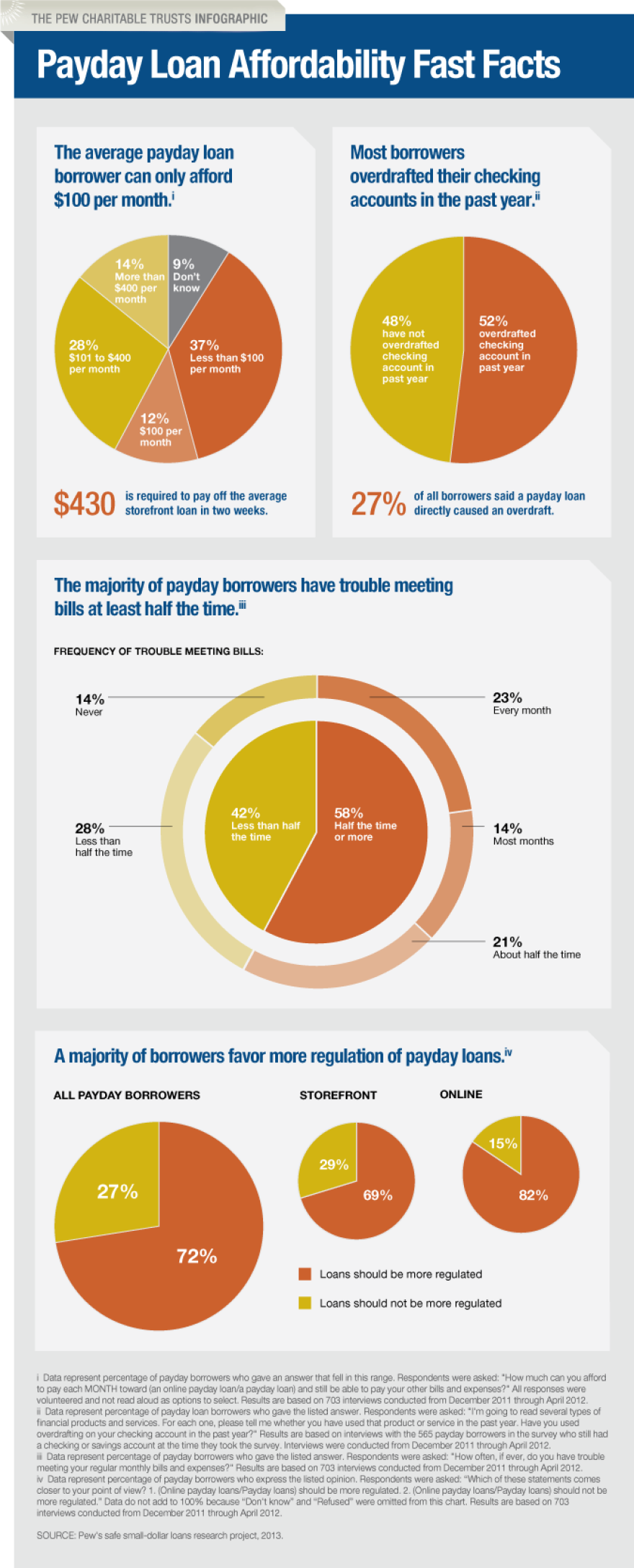Josie De La Fuente and her 30-year-old son live in a small two bedroom apartment in Southeast Fresno.
Just over a year ago, she joined the ranks of the thousands who turn to short term high interest loans to make ends meet.
She says taking out payday loan ensnared her.
“Imagine me getting a payday loan,” De La Fuente says. “Paying a 300 dollar loan and with all the bills that I have. You know the car payment, the apartment the rent and all that stuff. It’s not gonna help me and I’m not gonna have any money left with all of that.”
Just under 12 million Americans use payday loans each year to cover gaps in expenses and to pay for unexpected emergencies.

Here’s how it works. A borrower can walk into a loan store with a check and a paystub, and get a loan for, say $250. They give the lender a check for $300 dated for their next payday. In De La Fuente’s case, she was able to pay off her loans on time, but many consumers don’t or can’t.
“I don’t recommend it to anybody,” De La Fuente says. “It’s a situation that we get ourselves into and we think there is no way out but there is a way out.”
According to a new PEW Research Center study researchers found that only 14 percent of borrowers can afford enough out of their monthly budgets to repay an average payday loan of $400. And 27 percent of payday loan customers wind up with bank account overdraft fees.
It’s an issue that’s drawn the attention of Faith in Community, a Fresno based group of religious leaders who say the city has too many “loan sharks” that unfairly target low income communities, trapping people in a cycle of debt.
“We are okay with payday lenders operating because they fill a need, but 459% APR is absolutely unacceptable and immoral,” says Andy Levine, the director of Faith in Community.
Levine’s group is urging the Fresno city council to cap the number of payday lenders in the city at 67.
“We realize that is going to take a lot of organizing and a lot of pressure especially given how powerful the payday lobby is,” Levine says.
The group has been working with council member Oliver Baines to bring the issue of payday lending before the council in the coming months. Baines, declined to comment on this story.
For many, it’s an issue about social justice. Pastor Paul Binion, of Westside Church of God in west Fresno, says payday lenders prey on people of limited resources and education. He says members of his congregation continually deal with payday loans.
“We call them predators they take advantage of poor people those who feel they have no other options and there mission is not to help or assist but to take advantage of and to profiteer,” Binion says.
But those in the payday industry disagree. They say they are providing a needed resource.
"It was something that I needed to do and something that I needed to show for myself that I could do," Josie De La Fuente
“Payday lending is just one legitimate state regulated option for people who have bank accounts to access a small amount of cash for a short period of time,” says Greg Larsen, spokesman for the California Financial Service Providers Association. “The vast majority of payday lending customers like with almost every other financial product, they use the product responsibly, they pay it back on time and they’re done with product as intended.”
Jamie Fulmer, senior vice president of public affairs with Advance America one of the nation’s largest payday lending groups, says payday lenders are misunderstood.
“I think there are a lot of misconceptions and misunderstandings about the products and services that we offer by the general public, but by a segment of our population - the hard working middle income consumer – there is a very clear understanding of the value that we provide,” Fulmer says.
De La Fuente says the service was useful, but it was outweighed by the stress it brought her.
“It helps me in some way and in some ways it doesn’t because in some way I’m giving people money and that money I should be keeping for myself and that is the way that I see it,” De La Fuente says. “If I would of continued to going that way I would always be that way. My life I wouldn’t be able to change it.”

De La Fuente’s pastor suggested she get involved with the Center for Community Transformation at Fresno Pacific Seminary. The group’s goal is to educated churches and their congregations in financial literacy.
It was at the institute that De La Fuente learned how to manage her finances.
Andrew Fiel, a pastor at The Well Community Church in Fresno, mentored De La Fuente throughout her course.
“Josie had a $75 bill left on her payday loan and she was able to pay that off,” Fiel says. “She brought in the receipts to class and were able to cheer her on and got the chance to hear her say ‘I am never gonna use these things again,’” Fiel says.
De La Fuente said that learning the basics about personal financial management has changed the way she sees money.
“It was something that I needed to do and something that I needed to show for myself that I could do, because once you get hooked on something you just keep on, keep on, keep on and you never stop,” De La Fuente said.
Both payday lenders and advocates agree: the best way for people to avoid using payday lenders is to learn how to manage their finances and to only use lenders as a last well thought out resort.





